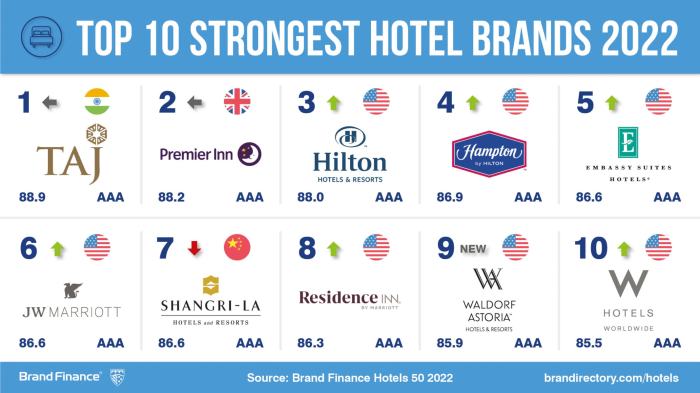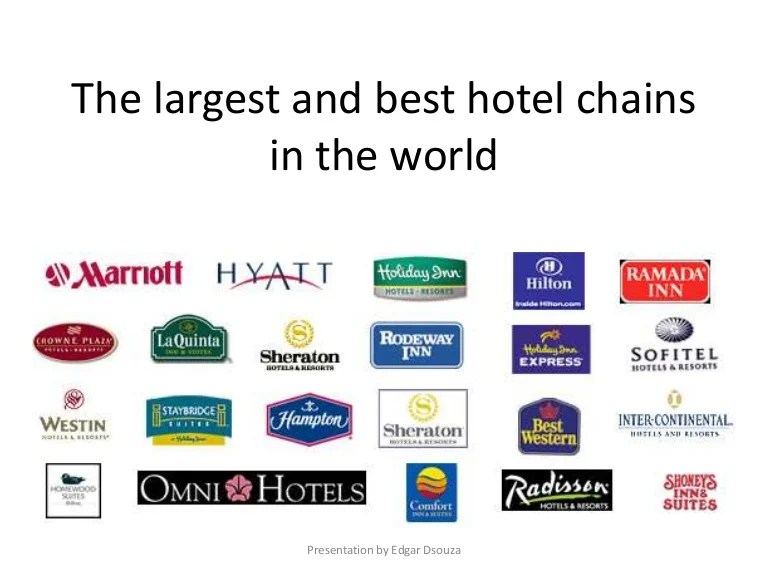Best global hotel chains, a constellation of hospitality giants, illuminate the skyline of the travel industry, offering travelers a haven of comfort, luxury, and exceptional experiences. These renowned brands have meticulously crafted their reputations, expanded their global presence, and continue to innovate, setting the benchmark for excellence in the hospitality sector.
Their allure lies not only in their opulent accommodations and world-class amenities but also in their unwavering commitment to service, loyalty programs that foster enduring relationships, and a deep-rooted sense of sustainability that aligns with the values of today’s discerning travelers.
Brand Reputation and Recognition

The reputation of global hotel chains is influenced by various factors, including:
1. Service quality: The level of customer service, comfort, and amenities offered by the hotel.
2. Brand consistency: The consistency of the hotel experience across different locations and properties.
3. Loyalty programs: The effectiveness of the hotel’s loyalty programs in attracting and retaining customers.
4. Online reviews: The impact of online reviews and social media on the hotel’s reputation.
Examples of Hotel Chains with Strong Brand Recognition
- Marriott International
- Hilton Worldwide
- InterContinental Hotels Group
- Hyatt Hotels Corporation
- AccorHotels
Global Presence and Expansion
To expand their global presence, hotel chains employ strategic initiatives that target key regions and countries with high potential for growth. These strategies include:
- Acquisitions and mergers: Acquiring or merging with existing hotel companies provides a quick and efficient way to expand into new markets and gain market share.
- Franchise and management contracts: Partnering with local operators through franchise or management contracts allows hotel chains to expand their brand and presence without incurring the full cost of ownership.
- Greenfield development: Developing new hotels from the ground up in strategic locations enables hotel chains to establish a strong brand presence and cater to specific market demands.
Major hotel chains operate in key regions and countries worldwide, including:
- North America: United States, Canada, Mexico
- Europe: United Kingdom, France, Germany, Spain, Italy
- Asia-Pacific: China, Japan, India, Singapore, Australia
- Middle East: United Arab Emirates, Saudi Arabia, Qatar
- Latin America: Brazil, Argentina, Mexico
The choice of expansion locations is influenced by various factors, such as:
- Economic growth and stability
- Tourism potential and demand
- Political and regulatory environment
- Availability of skilled workforce
- Competition and market saturation
Service and Amenities: Best Global Hotel Chains

Global hotel chains offer a wide range of services and amenities to cater to the diverse needs of their guests. These services and amenities are designed to enhance the guest experience and create a memorable stay. Different chains have their unique offerings, but some common services and amenities include:
- 24-hour room service:This service provides guests with the convenience of ordering food and drinks to their room at any time of the day or night.
- Concierge services:Concierges can assist guests with a variety of tasks, such as booking tours, making restaurant reservations, and arranging transportation.
- Fitness centers:Fitness centers allow guests to stay active during their stay. Many hotels also offer fitness classes and personal training.
- Business centers:Business centers provide guests with access to computers, printers, and other office equipment.
- Swimming pools:Swimming pools are a great way to relax and cool off during a hot day.
- Spas:Spas offer a variety of treatments and services, such as massages, facials, and body wraps.
Impact of Technology on Hotel Services and Amenities
Technology has had a significant impact on hotel services and amenities. In recent years, we have seen the rise of mobile check-in, keyless entry, and voice-activated controls. These technologies have made it easier for guests to check in and out of their rooms, access their rooms, and control various aspects of their stay.
We can also expect to see more innovative technologies being introduced in the future, such as augmented reality and virtual reality experiences.
Customer Loyalty and Rewards Programs
Customer loyalty programs are crucial for hotel chains as they foster repeat business and strengthen customer relationships. These programs reward customers for their patronage, encouraging them to continue choosing the chain over competitors.
Global hotel chains offer various types of loyalty programs, including:
Tiered Programs
- Customers earn points or miles based on their spending and stay duration.
- Points can be redeemed for free nights, upgrades, and other perks.
- Higher tiers offer exclusive benefits, such as access to executive lounges and priority reservations.
Co-branded Credit Cards
- Partnering with credit card companies, these programs allow customers to earn points on everyday purchases.
- Points can be used for hotel stays, dining, and other travel expenses.
- Co-branded cards often offer additional perks, such as airport lounge access and free nights after reaching spending thresholds.
Benefits and Challenges of Loyalty Programs, Best global hotel chains
Benefits:
- Increased customer loyalty and retention.
- Valuable data on customer preferences and spending habits.
- Enhanced brand image and customer satisfaction.
Challenges:
- Cost of implementing and maintaining the program.
- Balancing the value of rewards with profitability.
- Potential for customer churn if expectations are not met.
Sustainability and Environmental Practices

Sustainability has become an integral part of the operations of global hotel chains, as consumers increasingly demand eco-friendly practices and responsible tourism.
To meet these demands, hotel chains have adopted various eco-friendly initiatives, such as:
Water Conservation
- Installing low-flow fixtures in bathrooms and kitchens.
- Implementing water-saving irrigation systems for landscaping.
- Encouraging guests to reuse towels and linens.
Energy Efficiency
- Upgrading to energy-efficient lighting and appliances.
- Installing solar panels and geothermal heating systems.
- Optimizing building design for natural ventilation and daylighting.
Waste Reduction
- Implementing recycling programs for paper, plastic, and glass.
- Composting organic waste from kitchens and restaurants.
- Reducing single-use plastics, such as straws and water bottles.
These initiatives not only reduce the environmental impact of hotel operations but also enhance brand reputation and customer loyalty. Guests appreciate the efforts made by hotel chains to protect the environment, and they are more likely to choose hotels that prioritize sustainability.
If you’re planning a beach vacation in January, there are a few destinations that are especially appealing. The best beach vacation spots in january offer warm temperatures, sunny skies, and fewer crowds than during the peak season.
Financial Performance and Market Share
The financial performance of global hotel chains is a key indicator of their success and stability. Several factors influence their market share, including brand reputation, global presence, service quality, customer loyalty, and financial performance. To better understand the financial landscape of the industry, let’s compare the performance of some major hotel chains:
Financial Performance Comparison
| Hotel Chain | Revenue (USD) | Net Income (USD) | Profit Margin ||—|—|—|—|| Marriott International | 23.6 billion | 2.4 billion | 10.2% || Hilton Worldwide | 18.9 billion | 1.8 billion | 9.5% || InterContinental Hotels Group | 17.3 billion | 1.5 billion | 8.7% || Accor | 16.2 billion | 1.2 billion | 7.4% || Hyatt Hotels Corporation | 14.6 billion | 1.1 billion | 7.5% | Source: Company financial reportsAs seen in the table, Marriott International leads in terms of revenue and net income, followed by Hilton Worldwide and InterContinental Hotels Group.
Accor and Hyatt Hotels Corporation have lower revenue and net income but maintain healthy profit margins.
Factors Influencing Market Share
Several factors influence the market share of hotel chains:
-*Brand reputation and recognition
Strong brand recognition and a positive reputation enhance customer loyalty and drive demand.
-*Global presence and expansion
A wider global presence allows chains to cater to a broader customer base and increase their market share.
-*Service and amenities
If you’re looking for the best domestic beach vacations, you can’t go wrong with the best domestic beach vacations . With its stunning beaches, crystal-clear waters, and endless activities, there’s something for everyone. And if you’re looking for a great value, the ayres hotel chain offers comfortable and affordable accommodations that won’t break the bank.
Exceptional service, high-quality amenities, and tailored experiences contribute to customer satisfaction and brand loyalty.
-*Customer loyalty and rewards programs
Loyalty programs reward repeat customers and encourage them to choose the same chain over competitors.
-*Financial performance
Strong financial performance indicates stability and the ability to invest in growth and innovation, which can drive market share gains.
Strategies for Increasing Revenue and Profitability
Hotel chains employ various strategies to increase revenue and profitability:
-*Expansion into new markets
Entering new geographical areas or expanding within existing markets broadens their customer base and revenue streams.
-*Acquisition and partnerships
Acquiring smaller chains or partnering with other businesses can enhance their portfolio and reach.
For couples on a budget, there are plenty of best budget vacation spots for couples that offer affordable getaways without sacrificing quality. And if you’re looking for a quick and easy beach getaway, consider one of the best 3 night beach getaways . These short trips are perfect for a weekend escape or a mid-week break.
-*Diversification of revenue sources
Offering additional services such as dining, spa treatments, and event hosting generates incremental revenue.
-*Cost optimization
Implementing cost-saving measures, such as energy efficiency initiatives or streamlining operations, improves profitability.
-*Technology adoption
Utilizing technology to improve guest experiences, optimize operations, and enhance marketing efforts can drive revenue growth.
Case Studies and Examples
The global hotel industry is highly competitive, and success depends on various factors. By examining case studies of successful global hotel chains, we can identify the key elements that contribute to their dominance.
Hilton Worldwide
Hilton Worldwide is a leading global hotel chain with over 6,800 properties in 122 countries. Its success can be attributed to several factors, including:
- Brand Recognition:Hilton has built a strong brand reputation over decades, making it one of the most recognizable hotel brands worldwide.
- Global Presence:Hilton’s extensive global presence allows it to cater to travelers from all corners of the world.
- Loyalty Program:Hilton Honors, its loyalty program, offers rewards and benefits that encourage repeat business.
- Innovation:Hilton continuously innovates its services and amenities to meet the evolving needs of travelers.
Marriott International
Marriott International is another global hotel giant with over 8,100 properties in 139 countries. Its success is driven by:
- Diversified Portfolio:Marriott offers a wide range of hotel brands, from luxury to budget-friendly options, catering to diverse customer segments.
- Customer Service:Marriott is known for its exceptional customer service, which contributes to guest satisfaction and loyalty.
- Strategic Partnerships:Marriott has formed strategic partnerships with airlines and travel agencies, expanding its reach and distribution channels.
- Sustainable Practices:Marriott is committed to sustainability, implementing eco-friendly initiatives across its operations.
InterContinental Hotels Group
InterContinental Hotels Group (IHG) operates over 6,000 hotels in 100 countries. Its success is attributed to:
- Targeted Marketing:IHG uses targeted marketing campaigns to reach specific customer segments, such as business travelers and leisure travelers.
- Technology Integration:IHG has invested in technology to enhance guest experiences, such as mobile check-in and room keyless entry.
- Social Responsibility:IHG actively supports local communities and charitable organizations, building a positive brand image.
- Expansion Strategy:IHG has pursued an aggressive expansion strategy, acquiring new properties and entering emerging markets.
Lessons Learned
These case studies demonstrate that successful global hotel chains share common success factors:
- Strong brand recognition and reputation
- Extensive global presence
- Customer-centric approach and loyalty programs
- Innovation and adaptation to changing market trends
- Strategic partnerships and alliances
- Commitment to sustainability and social responsibility
Concluding Remarks
In the realm of global hotel chains, competition is fierce, and only the most exceptional brands emerge as true leaders. By understanding the intricacies of their success, we gain invaluable insights into the art of hospitality, the power of brand recognition, and the ever-evolving landscape of the travel industry.
As the world continues to embrace the joy of exploration, these best global hotel chains will undoubtedly remain at the forefront, shaping the future of travel and leaving an indelible mark on the memories of countless guests.


